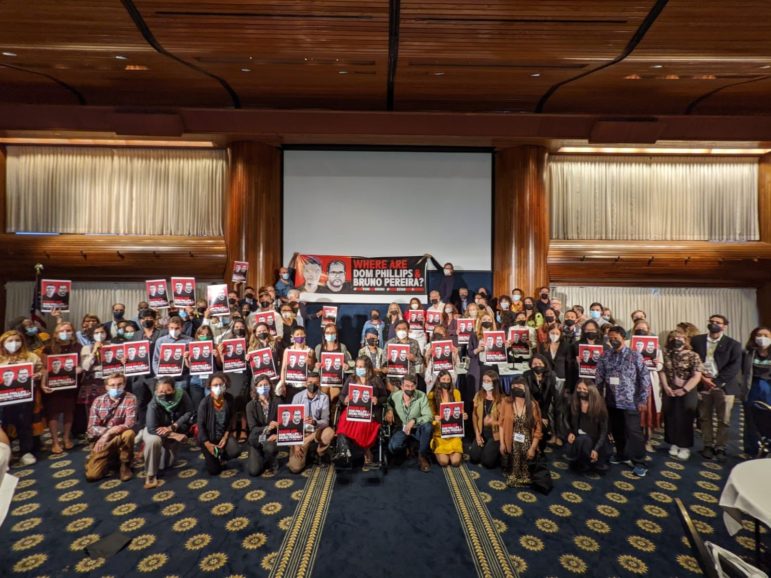

What We’re Reading: Systems Thinking for Journalists, Freelancer Tips, and Tracking Locust Swarms

This week’s Friday 5, where we round up our favorite reads from around the world in English, includes a toolkit for journalists on systems thinking from The New School, freelancer tips from the Pulitzer Center, and Bellingcat’s latest guide on tracking the locust swarms affecting East Africa.
Systems Thinking For Journalists (Journalism + Design)
In this toolkit for journalists from the impressive team at Journalism + Design at The New School in New York is a crash course on “systems thinking” for journalists. “Seeing the world in systems helps us look beyond immediate events and dig deeper into the forces, structures, and values that fuel them,” they write. It’s what journalists — particularly those of us working on in-depth journalism — try and do every day. What’s interesting here is the, well, systematic, big picture approach to stories and coverage areas which is important for reporters, editors, and newsrooms overall to think about more deeply. Consider the “iceberg” model which they have laid out as a foundation: the events are just the tip of the iceberg, but below that are the trends and patterns leading up to the event, the policies and power structures beneath that, as well as the experiences and worldviews which have fed into it.
Freelance Tips (Pulitzer Center)
The Pulitzer Center surveyed over 500 freelancers about the pressures they are facing and their feelings on managing safety in the midst of the COVID-19 pandemic. What they came back with were personal and professional tips from their colleagues around the world. Some tips included: find places where your beat intersects with the pandemic, and pitch those stories; look for stories that condense the big, confusing picture; and talk with editors about safety parameters before going into any reporting situation. For more on freelancing, check out GIJN’s new pitching guide for freelance investigative journalists, this tipsheet on freelancing during the pandemic, as well as our recent webinar on the topic.
How to Track Desert Locust Swarms (Bellingcat)
For a pandemic diversion, take a look at Bellingcat’s “how to” on the locust hordes now swarming over East Africa. Edward Tian focused on the four crucial aspects of analyzing the swarms: movement, weather and climate, containment efforts of locust breeding, and agricultural impact. Using United Nations datasets and open source tools, the guide lays out how individual investigators can better understand and monitor a crisis the UN calls an “unprecedented threat to food security,” and the worst locust upsurge in the region in 70 years.
Contracts, Data, and Investigations – COVID-19: Edition (Open Contracting Partnership)
Toby McIntosh, senior adviser to GIJN’s Resource Center, points out the interesting work the good people at the Open Contracting Partnership are doing around the pandemic. Sign up for OCP’s special edition newsletter, which gathers stories on the “use and abuse of government contracts during the COVID-19 pandemic.” A recent issue highlighted an investigation in El Salvador by GIJN member El Faro into a $3 million mask deal between the health ministry and a ceramics firm; Europe-wide investigations by another GIJN member, the Organized Crime and Corruption Reporting Project, into misleading compliance certificates for personal protective equipment (PPE); and the Kathmandu Post’s look inside the chain of command at Nepal’s health ministry during the pandemic. For more on researching COVID-19 government contracts, take a look at GIJN’s recent guide and webinar on the topic.
Will Global Journalism Miss Out on Recovery Funds? (Poynter)
In this piece for Poynter, Netherlands-based media consultant Rieneke Van Santen argues that donors need to prioritize press freedom in their upcoming policy frameworks, particularly in the time of the pandemic. Van Santen points out the “dire situation of the media” as European member states finalize the EU budget for 2021-2027, pointing toward the 15 press freedom organizations who have urged for the inclusion of recovery plans for media. She notes comments from Mira Milosevic and Michael J. Oghia of the Global Forum for Media Development who wrote about “the perfect storm of disinformation, market destabilization, digital repression of critical voices, and the disruption of our daily lives caused by the COVID-19 crisis,” arguing that information — and journalists — save lives.
 Tanya Pampalone is GIJN’s managing editor. Prior to GIJN, she was executive editor of Mail & Guardian, managing editor of Maverick (now Daily Maverick), and head of strategic partnerships and audience development for the African arm of The Conversation. Tanya is also co-editor of I Want To Go Home Forever, and a contributor to Southern African Muckraking and Unbias the News.
Tanya Pampalone is GIJN’s managing editor. Prior to GIJN, she was executive editor of Mail & Guardian, managing editor of Maverick (now Daily Maverick), and head of strategic partnerships and audience development for the African arm of The Conversation. Tanya is also co-editor of I Want To Go Home Forever, and a contributor to Southern African Muckraking and Unbias the News.









